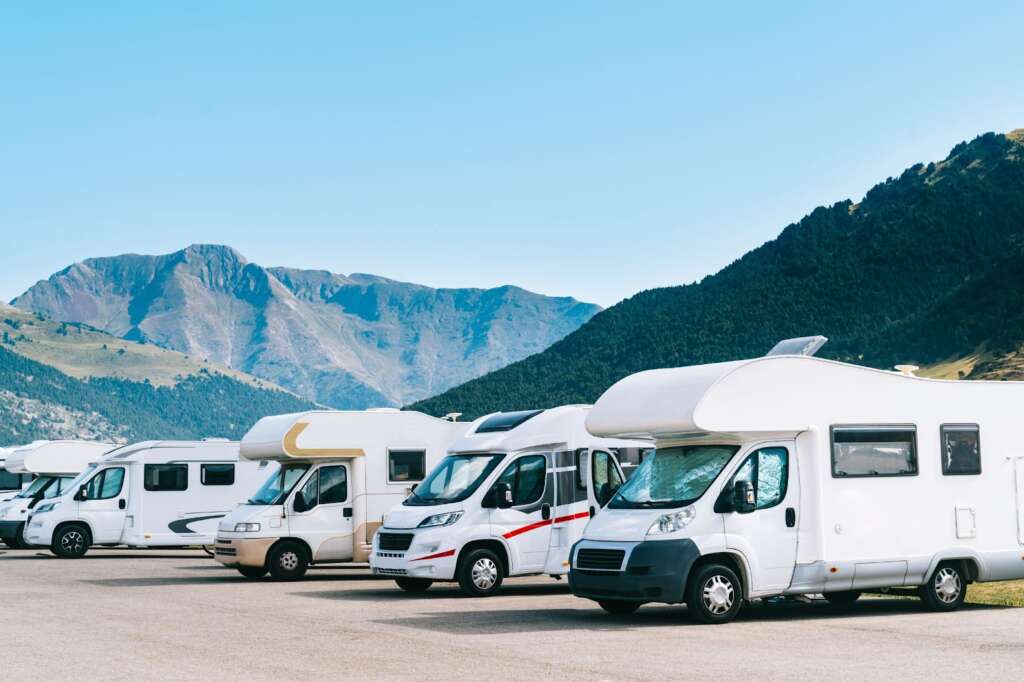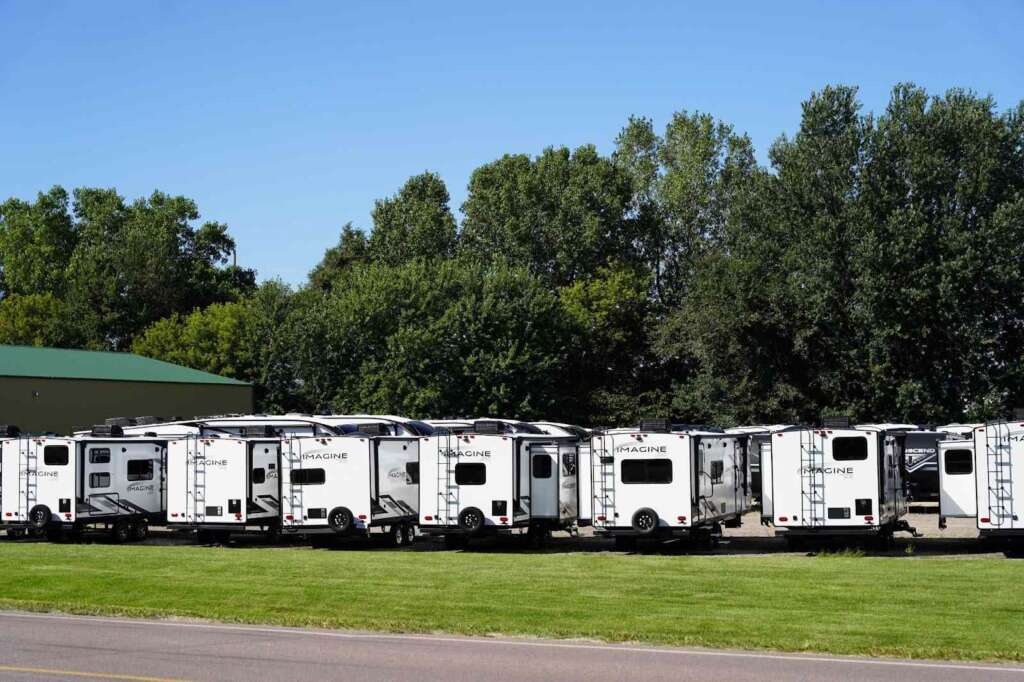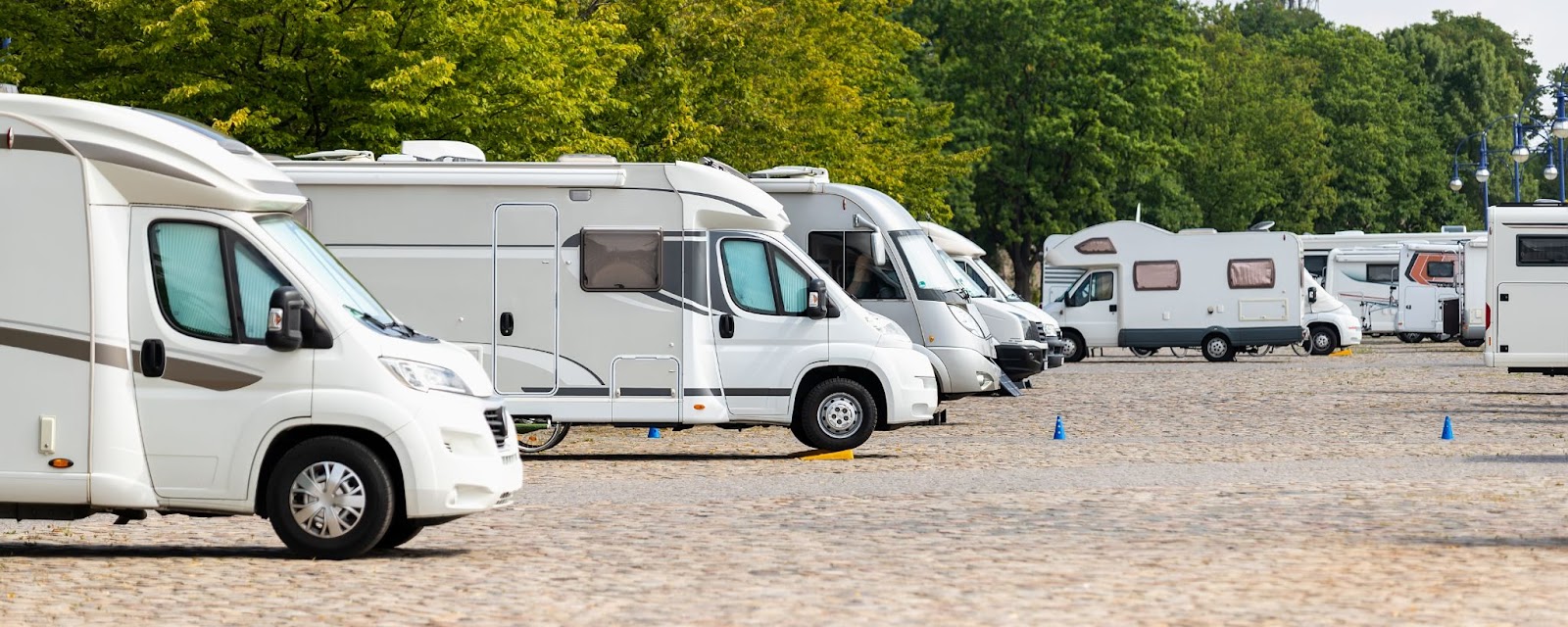Your RV is your ticket to adventure, freedom, and unforgettable road trips. But when you’re not using your RV, you need good RV self-storage.
Choosing the right self-storage facility isn’t always as simple as picking the closest one or the cheapest rate. Your RV has unique needs, and the wrong setup will lead to headaches, damage, or unexpected costs.
In this guide, we’ll explain everything you should look for in a reliable RV self-storage facility, from unit size and security features to pricing, amenities, and access.
Whether you’re storing for the off-season or between trips, these tips will help you make a smart, confident decision and protect the RV that takes you everywhere.
Know your RV’s size and storage needs
Before you start comparing RV self-storage facilities, it’s important to know exactly what kind of space you need. RVs vary widely in size, from compact camper vans to full-size motorhomes. So, a one-size-fits-all approach won’t work.
The key is to measure your RV from end to end, including any add-ons like hitches, ladders, or roof-mounted accessories. Don’t rely on the manufacturer’s specs alone. Measure it yourself to be sure.
Once you have the dimensions, you’ll better understand what type of RV self-storage fits your needs. If you’ve got a Class A motorhome or fifth wheel, you might need a facility with extra-wide lanes and pull-through spaces.
Smaller RVs, like travel trailers or Class B vans, are often a good fit for covered or even outdoor spaces, depending on your climate and how often you use the vehicle.

Compare types of RV storage
There are three main types of RV self-storage. Here’s a breakdown to help you choose the right fit:
Outdoor RV storage
This is the most common and budget-friendly option. Your RV is parked in an open lot, usually on gravel or pavement. It’s easy to access and ideal for larger rigs or short-term storage. A high-quality cover will protect it from the elements.
Covered RV storage
Think of this as a carport for your RV. It offers an overhead roof to shield your vehicle from direct sun, rain, hail, and snow.
Indoor RV storage
Your RV will be in a fully enclosed garage-style unit or warehouse, protected from weather and pests. This is the most expensive option and may be limited for oversized RVs.
Prioritize facility security features
Your RV is a valuable investment; keeping it safe should be a top priority. The right storage facility offers strong security features that protect your vehicle and give you peace of mind. Knowing what to look for helps you choose a place where your RV is always in good hands.
- Gated access: Start with gated access. A secure, keypad-controlled gate limits only tenants and staff entry.
- Surveillance: Continuous video monitoring deters theft and vandalism and provides valuable evidence if anything goes wrong.
- Well-lit grounds: Bright lighting keeps the area visible after dark, making routine checks easier for staff.
- On-site staff or regular patrols: Having a real person on the property, during business hours or around the clock, adds peace of mind and allows a quick response if something’s off.
Check for RV-friendly amenities
Many storage facilities offer helpful features designed specifically for RVs, so it’s worth looking for one that makes storing and accessing your rig easy and hassle-free.
Space to move
Start with space to move. Wide drive aisles and pull-through parking spots are a game changer, especially if you’re backing in a trailer or driving a large Class A motorhome. Tight turns and narrow lanes can make every visit a hassle, so make sure the layout works for big vehicles.
Helpful add-ons
Next, ask about practical extras. A good RV storage facility may offer helpful add-ons like dump stations, water hookups, air compressors for tires, and even trickle charging for batteries. These small details can save you an extra trip or two and keep your RV ready to go when you are.
Access hours
Also, check gate access hours. If you like to hit the road early or return late, you’ll want a facility with extended or 24/7 access.
Consider location and convenience
Where your RV is stored matters almost as much as how it’s stored. A facility might check all the boxes for size and security, but if it’s out of the way or hard to access, you’ll feel that frustration every time you use it.
Look for a storage location that’s close to home or along your usual travel routes. This saves you time and gas when it’s time to pick up your RV for a trip or drop it off after a long drive. Being near home adds peace of mind if you’re an occasional traveler. If you’re a frequent adventurer, easy highway access makes weekend getaways that much smoother.
Factor in pricing and policies
When it comes to RV storage, price matters, but it’s not the only thing you should look at. A low monthly rate might seem like a great deal at first, but it’s important to understand exactly what you’re paying for.
Start by asking for a full breakdown of costs and consider asking the following questions:
- What is the base rate?
- Are there extra fees for gate access?
- Are there setup fees?
- Is there required insurance?
- Does the facility charge penalties for late payments or early move-outs?
Make sure you know what’s included and what could come up later.
Also, look into rental terms. Month-to-month agreements offer flexibility, but long-term contracts often come with discounts. If you plan to store your RV for several months or year-round, ask about any special pricing or promotions.
It’s also worth asking about refund policies, cancellation terms, and what happens if you upgrade or downgrade your space. The more you know up front, the easier it is to avoid stress later.

Read reviews and visit in person
Online photos and price lists only tell part of the story. Knowing if a storage facility is the right fit for your RV helps to hear from people who’ve already been there and take a look for yourself.
Start with reviews. Real customer feedback will give you insight into the facility’s management, how secure it feels, and how helpful the staff are. Look for mentions of cleanliness, responsiveness, ease of access, and whether people feel their RVs are well cared for.
Once you’ve narrowed down your options, visit in person. Seeing the facility firsthand gives you a clear sense of space, layout, and condition. You’ll be able to check drive aisles, gate access, lighting, and grounds maintenance. It’s also a great chance to meet the staff and ask questions about policies, security, and RV-specific features.
Store your RV at Bear River Storage
When it comes to RV self-storage, peace of mind starts with choosing a facility you can count on. At Bear River Storage, we offer open RV storage parking designed with your convenience in mind. Our spacious layout makes it easy to park and access your rig, whether you’re heading out for a weekend getaway or storing it for the off-season.
With gated access, 24/7 video surveillance, and a team that genuinely cares, you’ll know your RV is in good hands. We make the process simple, transparent, and tailored to your needs without hidden fees or unnecessary stress.
We also offer on-site propane refills. Whether you’re prepping for your next trip or topping off after a long haul, you can refill your tanks quickly and easily without making an extra stop. It’s one more way we help you stay road-ready and hassle-free.
Contact Bear River Storage today to learn more or reserve your open RV parking space. We’re ready when you are.



